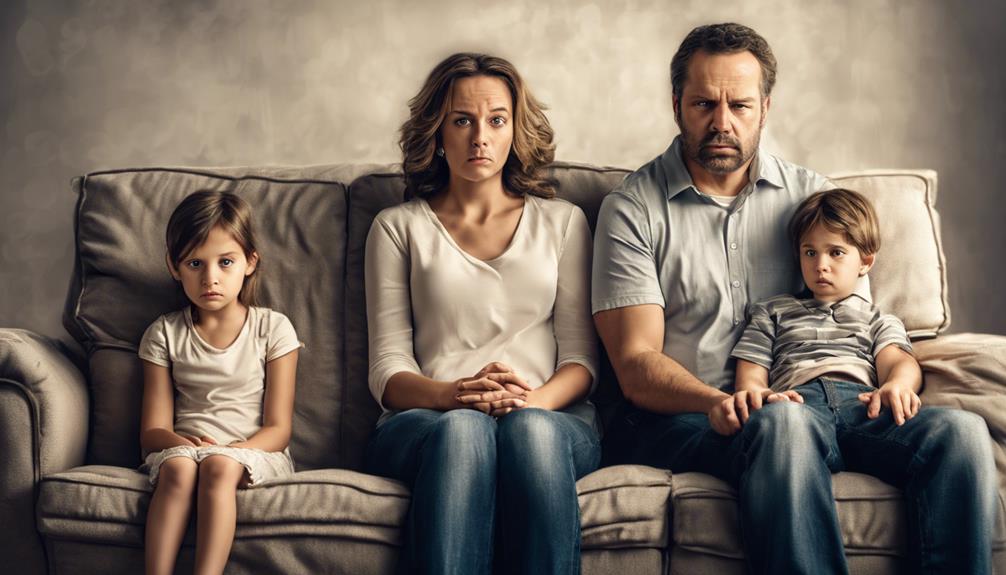It’s crucial to acknowledge that approximately 40% of marriages in Iowa end in divorce, highlighting the need to tread carefully on this challenging path, especially when children are involved.
The emotional and legal complexities can be overwhelming, but by following a structured approach, individuals can ensure the well-being of their children remains a top priority.
The Step-By-Step Guide we will explore offers practical insights and strategies to help parents navigate the intricate landscape of divorce in Iowa, providing a roadmap for a smoother transition.
Key Takeaways
- Iowa's no-fault divorce simplifies the process for couples with irreconcilable differences.
- Custody decisions in Iowa prioritize the child's best interests for their well-being.
- Parenting plans in Iowa focus on stability and meeting children's physical, emotional, and educational needs.
- Child support in Iowa is determined by parents' incomes and must cover all child-related expenses for their support.
Legal Requirements for Divorce in Iowa
When filing for divorce in Iowa, the legal requirements focus on citing irreconcilable differences as the grounds for the dissolution of marriage. Iowa operates as a no-fault state, meaning detailed reasons for divorce aren't mandatory.
The grounds for divorce in Iowa stem from the breakdown of the marriage rather than proving fault. This approach streamlines the divorce process, allowing couples to focus on moving forward from the situation.
Understanding these legal requirements is crucial when navigating the complexities of ending a marriage in Iowa. Whether considering child custody and support or spousal support, knowing that fault doesn't need to be proven can provide some relief during an emotionally challenging time.
By recognizing irreconcilable differences as the primary grounds for divorce, couples can take steps towards a more amicable separation.
Navigating the legal aspects of filing for divorce in Iowa sets the foundation for a smoother transition out of the marriage.
Establishing Custody Arrangements

As we move forward in the divorce process, a key aspect to address is establishing custody arrangements for any children involved. In Iowa, the courts recognize both legal and physical custody, with the child's best interests taking precedence in determining physical custody. While joint physical custody isn't mandatory for joint legal custody, Iowa allows for flexible custody arrangements that prioritize the child's well-being.
Factors such as the child's emotional and physical health, their relationship with each parent, and the parental ability to provide care are carefully considered in custody decisions. It's essential to focus on creating custody arrangements that promote the child's overall well-being during this challenging time.
Consulting with a lawyer experienced in child custody matters can help navigate the complexities of custody disputes, ensuring that the child's best interests remain at the forefront of any decisions made. Remember, the goal is to establish a custody arrangement that supports the child's growth and development in a stable and loving environment.
Creating a Parenting Plan in Iowa
Crafting a detailed parenting plan in Iowa is essential for outlining child custody, visitation schedules, decision-making authority, and more to ensure the well-being of the children involved. In Iowa, the parenting plan must prioritize the children's best interests, encompassing their physical, emotional, and educational needs.
Parents are encouraged to collaborate on creating a comprehensive plan, seeking assistance from mediators or legal professionals when necessary. Iowa courts mandate the submission of a parenting plan in divorce or custody cases to safeguard the children's welfare. It's crucial to focus on stability and the children's overall well-being throughout the process.
While parenting plans can be modified in Iowa if circumstances change, the primary consideration remains the children's welfare. Ensuring that the plan is detailed, considerate, and in alignment with the children's best interests is key for successful court submission and long-term effectiveness.
Guidance on Child Support Considerations

To ensure the well-being of your children during and after a divorce in Iowa, understanding child support considerations is vital. When navigating child support in Iowa, keep the following guidance in mind:
- Child Support Guidelines: Familiarize yourself with the child support guidelines in Iowa, which are calculated based on both parents' incomes and the number of children requiring support.
- Child Support Guidelines Worksheet: Be prepared to complete the Child Support Guidelines worksheet as it helps determine appropriate support amounts tailored to your specific situation.
- Support Duration: Child support payments typically continue until the child reaches the age of majority or completes their secondary education, ensuring their well-being and care.
- Payment Accuracy and Timeliness: Ensuring accurate and timely payment of child support is crucial. Consider all child-related expenses, including medical costs and daycare, to provide for your children's needs effectively.
Prioritizing Children's Well-being in Divorce
Prioritizing children's well-being during a divorce in Iowa is fundamental to ensuring a successful and healthy transition for them. Addressing children's emotional needs and stability is crucial for their overall well-being. Encouraging open communication with children can help them cope with the changes and express their feelings throughout the process. Coordinating parenting plans that prioritize the children's best interests and routines can provide them with a sense of stability during a time of uncertainty. Seeking professional guidance or counseling for both the children and parents can offer valuable support and assistance in navigating the complexities of divorce while ensuring the children's well-being remains a top priority. By focusing on the children's emotional and practical needs, parents can help facilitate a smoother transition and create a supportive environment that puts the children's best interests at the forefront.
| Strategies for Prioritizing Children's Well-being in Divorce |
|---|
| Addressing emotional needs |
| Encouraging open communication |
| Coordinating parenting plans |
| Seeking professional guidance or counseling |
| Prioritizing children's best interests |
Frequently Asked Questions
How Can I Help My Children Cope With the Emotional Impact of Divorce in Iowa?
We can help our children cope with the emotional impact of divorce in Iowa by providing a safe space for them to express their feelings, maintaining routines, seeking therapy if needed, and reassuring them of our love and support.
What Are Some Resources Available in Iowa to Support Children Going Through a Divorce?
It's ironic that in Iowa, amidst the cornfields, we find a wealth of resources to support children through divorce. From counseling services like Tanager Place to community programs, our little state offers big help.
Are There Any Specific Laws or Regulations in Iowa Regarding Co-Parenting After Divorce?
In Iowa, specific laws govern co-parenting after divorce. These regulations aim to ensure both parents fulfill their responsibilities towards the children. Understanding and complying with these laws can facilitate a smoother transition for everyone involved.
How Can I Navigate the Process of Introducing a New Partner to My Children After Divorce in Iowa?
Navigating the process of introducing a new partner to our children after divorce in Iowa is a delicate dance. We must proceed with sensitivity, open communication, and consideration for our children's feelings and needs.
What Steps Should I Take to Ensure That My Children's Education and Extracurricular Activities Are Not Negatively Affected by the Divorce in Iowa?
To ensure our children's education and extracurricular activities remain stable through divorce in Iowa, we prioritize open communication with teachers, counselors, and coaches. Collaborating on schedules and providing emotional support helps maintain their routines and well-being.
Conclusion
In conclusion, navigating divorce in Iowa with children requires careful consideration of legal requirements, custody arrangements, parenting plans, and child support. By prioritizing the well-being of children throughout the process, parents can ensure a smoother transition for their family.
For example, Sarah and John worked together to create a co-parenting plan that focused on their children's needs, resulting in a successful and amicable divorce that put their children first.
Remember, with guidance and support, you can navigate divorce with your children's best interests at heart.










